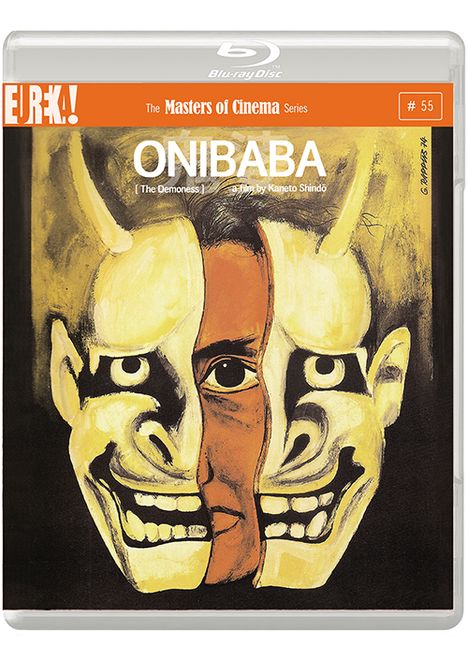Onibaba (1964) (Blu-ray) (UK-Import)
Onibaba (1964) (Blu-ray) (UK-Import)
Blu-ray Disc
Blu-Ray Disc
Die Blu-Ray wurde als High-Definition-Nachfolger der DVD entwickelt und bietet ihrem Vorläufer gegenüber eine erheblich gesteigerte Datenrate und Speicherkapazität. Auf Blu-Rays können daher Filme mit deutlich besserer Auflösung gespeichert werden und bieten auf entsprechenden Bildschirmen eine enorm hohe Bildqualität. Blu-Ray-Player sind in der Regel abwärtskompatibel zu DVDs, so dass auch diese abgespielt werden können.
Lieferzeit beträgt mind. 4 Wochen
(soweit verfügbar beim Lieferanten)
(soweit verfügbar beim Lieferanten)
EUR 17,99**
EUR 16,99*
- Japan, 1964
-
Dieser Titel ist nicht FSK-geprüft.
Eine Lieferung an Minderjährige ist nicht möglich.
Infos zu Titeln ohne Jugendfreigabe - Bestellnummer: 2642685
- Erscheinungstermin: 25.2.2013
- Serie: Masters of Cinema
-
Genre:
Drama
Spieldauer: 100 Min. - Regie: Kaneto Shindo
- Originaltitel: Onibaba (1964)
- Sprache: Japanisch
- Bild: Widescreen (s/w)
- Untertitel: Englisch
- Specials: Full-length audio commentary by director Kaneto Shindô and the stars of the film, Kei Satô and Jitsuko Yoshimura • Video introduction by Alex Cox • 46 minutes of 8mm footage shot on location by lead actor Kei Satô • Optional English subtitles • Original theatrical trailer • 36-PAGE BOOKLET with an essay by Doug Cummings; a 2004 statement from writer / director Kaneto Shindô about why he made Onibaba; an English translation of the original short Buddhist fable that inspired the film; a 1972 interview with Shindô conducted by Joan Mellen; and rare imagery.
Kaneto Shindo, one of Japan’s most prolific directors, received his biggest international success with the release of Onibaba in 1964. Its depiction of violence and graphic sexuality was unprecedented at the time of release. Shindo managed — through his own production company Kindaï Eiga Kyokai — to bypass the strict, self-regulated Japanese film industry and pave the way for such films as Yasuzo Masumura’s Mojuu (1969) and Nagisa Oshima’s Ai no corrida (1976).
Onibaba is set during a brutal period in history, a Japan ravaged by civil war between rivaling shogunates. Weary from combat, samurai are drawn towards the seven-foot high susuki grass fields to hide and rest themselves, whereupon they are ambushed and murdered by a ruthless mother (Nobuko Otowa) and daughter-in-law (Jitsuko Yoshimura) team. The women throw the samurai bodies into a pit, and barter their armour and weapons for food. When Hachi (Kei Sato), a neighbour returning from the wars, brings bad news, he threatens the women’s partnership.
Erotically charged and steeped in the symbolism and superstition of its Buddhist and Shinto roots, Kaneto Shindo’s Onibaba is in part a modern parable on consumerism, a study of the destructiveness of sexual desire and — filmed within a claustrophobic sea of grass — one of the most striking and unique films of the last century, winning Kiyomi Kuroda the Blue Ribbon Award for Cinematography in 1965. The memorably frenetic drumming soundtrack was scored by long-time Shindo collaborator Hikaru Hayashi.
Onibaba is set during a brutal period in history, a Japan ravaged by civil war between rivaling shogunates. Weary from combat, samurai are drawn towards the seven-foot high susuki grass fields to hide and rest themselves, whereupon they are ambushed and murdered by a ruthless mother (Nobuko Otowa) and daughter-in-law (Jitsuko Yoshimura) team. The women throw the samurai bodies into a pit, and barter their armour and weapons for food. When Hachi (Kei Sato), a neighbour returning from the wars, brings bad news, he threatens the women’s partnership.
Erotically charged and steeped in the symbolism and superstition of its Buddhist and Shinto roots, Kaneto Shindo’s Onibaba is in part a modern parable on consumerism, a study of the destructiveness of sexual desire and — filmed within a claustrophobic sea of grass — one of the most striking and unique films of the last century, winning Kiyomi Kuroda the Blue Ribbon Award for Cinematography in 1965. The memorably frenetic drumming soundtrack was scored by long-time Shindo collaborator Hikaru Hayashi.

Onibaba (1964) (Blu-ray) (UK-Import)
EUR 17,99**
EUR 16,99*





